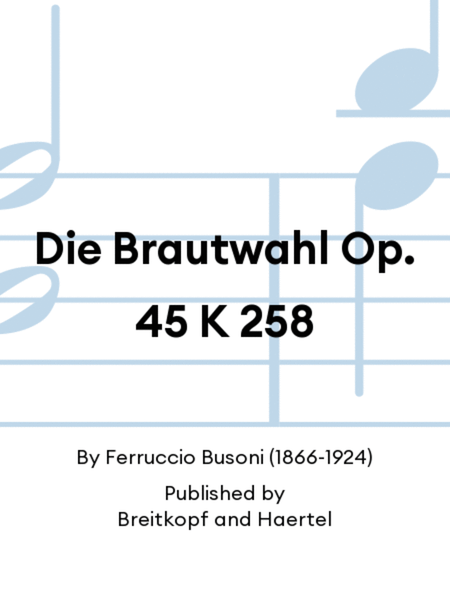Die Brautwahl Op. 45 K 258
Musical-phantastic Comedy in 3 Acts with a Postlude
-
Ships in 3 to 4 weeks
Details
Description
SKU: BR.EB-9432
Musical-phantastic Comedy in 3 Acts with a Postlude. Composed by Ferruccio Busoni. Choir. Edition Breitkopf. Opera; Music theatre; Early modern; Late-romantic. Piano/Vocal Score. Breitkopf and Haertel #EB 9432. Published by Breitkopf and Haertel (BR.EB-9432).ISBN 9790004189092. 0 x 0 inches.
Duration: full evening Text by the composer basesd on E.T.A. Hoffmann's tale of the same name from Serapionsbrudern Translation: ital. (G. Trampus), La sposa sorteggiata Place and time: Berlin, um 1820 Characters: Der Kommissionsrat Voswinkel (baritone) - Albertine, his daughter (mezzo-soprano) - Thusman, Freier (tenor) - Edmund Lehsen, paintor, Freier (tenor) - Baron Bensch, Freier (tenor) - the goldsmith Leonhard (baritone) - the jew Manasse (bass) - the valet Voswinkels - crowd, a Chancre (silent parts) In Busoni's musical evolution, this work marks an important phase of radical change after works inspired by Brahms and Verdi. The composer's compositional style became increasingly revolutionary between the sketch of the shport score (1908) and the completion of the orchestral score (1911).Busoni took the greatest care in preparing the definitive form of the work. He asserted that there was invention in every bar, and assigned an important role to the use of music from other sources: the Hebrew march from Rossini's Mose, for example, or a German dance by Mozart, military music, American-Indian pentatonic music, Gregorian plainchant, melodies from the synagogue and even quotes from his own works. With these stylistic means, Busoni followed Hoffmann's serapiontic principle and came closer to his idea of a timeless world music without borders.

 Share
Share